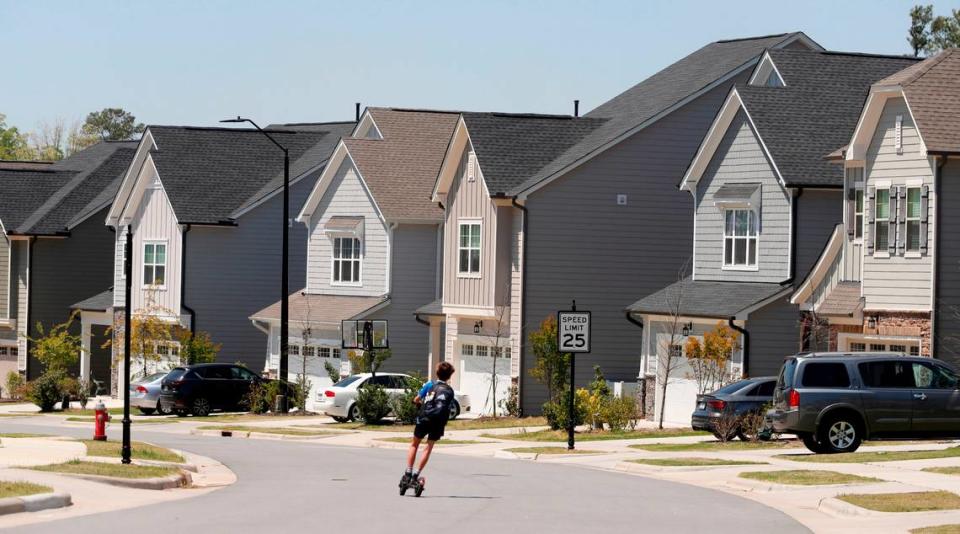More than half in NC worry they can’t make housing payments, new poll finds

As median home values and rents rise, over half of North Carolinians surveyed in a new poll said they were at least a little worried in recent months that they couldn’t make rent or mortgage payments.
The Elon University poll, conducted from Oct. 15 to Oct. 17, surveyed 1,234 North Carolinians. Among those, 27% said they were a little worried about missing a rent or mortgage payment in the past six months, 15% were somewhat worried and 10% were very worried — a total of about 52%.
Among respondents, 49% were not worried at all. The numbers do not total 100 due to rounding.
Samuel Gunter, executive director of the N.C. Housing Coalition, said the COVID-19 pandemic and the economic fallout from it contributes to these worries.
“It’s not something that shocks me at all,” Gunter said of the poll results. “Given a lot of uncertainty at the moment, whether or not jobs that exist now are going to exist next month is a question mark. Folks who are on hourly wages, working in service sector jobs, whether or not a local business is going to survive.… I think all of that contributes to that anxiety.”
The poll results also come at a time when rents and home values continue to rise dramatically.
During the first half of 2021, median home sale prices in Wake County increased every month, The News & Observer reported.
It hit an all-time high of $390,000 in September.
In the past year, average rent has increased by 22% in the Raleigh-Cary metro area, according to Apartment List. Last month, the average monthly rent for the area was $1,508.
In the Durham-Chapel Hill metro area, the annual increase was 18%. The average rent in September was $1,365.
“There are a number of North Carolinians who feel vulnerable when it comes to housing payments,” said Jason Husser, director of the Elon University Poll. “Unfortunately, the folks who feel vulnerable, we know from lots of other research, are also vulnerable to all sorts of social inequities as well.”
Renter, non-white, low-income households more vulnerable
People with low income are more likely to be worried about making housing payments, according to the poll.
Among those survey respondents who earn $60,000 or less a year, 26% said they had been very worried about paying their monthly housing payment since April.
For those above that income, it was just 6%.
The sample size was small when breaking down by income. The margin of error for the entire poll was plus or minus 3 percentage points. For the subcategories — income, race, etc. — the margin is much higher, Husser said, due to the smaller sample.
Renters are also more worried than owners, the poll found. Among renter respondents, 18% said they had been very worried compared to 5% of owners.
“It’s incredibly costly to be poor in this country,” Gunter said. “If you have money, have access to capital, the likelihood that you’ll be in a position to be able to get a mortgage and a lower interest rate mortgage, so your monthly payments are less, is much greater.”
Renters are more likely to be cost-burdened in general, according to data from the N.C. Housing Coalition.
As of 2019, 41% of renters in Wake County pay 30% or more of their income on housing costs. In Durham County, the share is 49%. For owners, it’s 16% for both counties.
“It’s a major challenge of our housing market,” Gunter said. “The more money you have, the more likely you are to gain access to financing that can get you cheaper housing.”
Non-white respondents were more likely to be worried about paying for housing as well.
Among Black people who responded to the survey, 13% were very worried. For other non-white groups, whose ethnicities were not specified in the poll, it was 11%.
Among white respondents, just 9% were very worried while 53% said they were not worried at all. Among Black people, 41% said they weren’t worried about paying for housing.
“We do often see racial differences emerging over resource differences, simply because on average, white North Carolinians are wealthier than Black North Carolinians,” Husser said.
How to increase housing stability
Gunter said one way to promote affordability is more dense, vertically built housing, where there are more units on one lot as opposed to one single-family house.
“There’s a supply issue that’s connected to land-use policy,” he said. “It’s manufacturing scarcity.”
But 60% in the Elon poll said they opposed denser housing, where renters often live.
Among those who own, 64% opposed denser housing. For renters, 51% didn’t support the policy, though the sample size was small.
“There’s a lot of stigma attached to folks who rent,” Gunter said.
He also said higher incomes would improve housing stability.
“For folks who are working jobs, whose incomes are not going up,” Gunter said, “folks who are waiting tables, folks who are sweeping floors, folks who are cutting hair ... their incomes really aren’t going up. They’re staying the same, but everything around them is getting more expensive.”
Help us cover your community through The News & Observer's partnership with Report For America. Contribute now to help fund reporting on housing affordability in the Triangle, and to support new reporters.

 Yahoo Movies
Yahoo Movies 